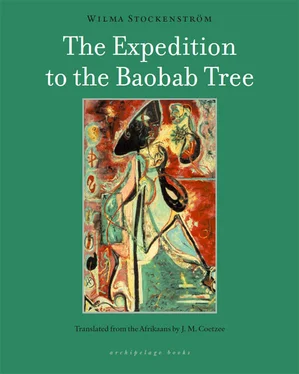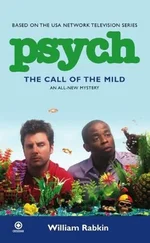The day after my benefactor’s death, when I, soggy with love and confused, had gone in search of the stranger, then too the fear was with me, and it was fear and longing that propelled me forward; and uncertainty, the only certainty I could always count on, led me to streets where mold made the walls break out in multicolored sores and the gates hung askew and rotten and I recognized a building, I recognized some of the slaves who went in and out there with baskets on their backs. It was my previous owner’s spice warehouse and I decided to visit my girlfriend, and I arrived in my splendid silk robe and my new quick way of talking, my precious manners, and there I stood awkward with embarrassment, confined within my affectations.
She sat with her legs crossed on the ground in front of the dilapidated hut scratching in the sand with a stick. The hens and chicks scoured as before in the yard, around the huts and house, and around the mango trees where fallen fruit stank sourly. She did not seem to mind the chicken shit and the filth. A naked baby with snotsmears on its top lip crept about on one side and stuck filthy sand into its mouth. I asked if it was hers. She did not reply. She gazed at me. I wanted to pick up the baby but thought better of it. I considered what I could give him. My friend gazed at me. When I walked off, I felt that piercing gaze on me. I felt someone throw something that hit me. I turned around. I saw her picking up handfuls of sand and throwing them at me. I called her name. The baby, also hit by the sand, laughed with delight. Then he began to cry. I walked off, overcome. The baby cried with rage.
I went back past the slaughterhouse and the tall palm trees there that tried not to see anything. I walked past the market women and the slave square and the skiffs drawn up on the beach, their masts snapped back like comical antennae. I saw the sole dhow frisking on the swell and called out again my shrill inquiry about the stranger and saw again gestures saying no, and I turned back to the great dreary silent house where bundles of jasmine bulged over the garden walls and put their scent in service of the dead.
How did my benefactor come by his wealth? I once asked the stranger, when he and I were all that remained. I stroked the pea-shaped swellings of the scarification marks on his forehead. My finger glided over them. Two mad pioneers that we had become, now two devoted to each other.
How? I asked again in the intervals between a lourie’s abuse. My finger glided over his lips, purple as a fig. How thin he had become, it struck me. His cheeks so sunken. He lay with eyes closed in a hollow full of soft moldering leaves.
Busybody, he tried to hush me. I kept on asking.
Your kind made him the most powerful person in the city, the stranger then said. You ought to feel flattered, actually. Your benefactor was a connoisseur in a class of his own and seldom bought lower-grade material. In your case he was absolutely right. Look, he indicated, your physical proportions are of a rare symmetry.
He wanted to stroke me. I pulled my arm away.
How did he come by his wealth?
Again the stranger came with evasive explanations of aesthetic considerations that had led the benefactor-merchant to seek perfection, a balance between beautiful externals and the intrinsic, and that had also led him to view his slaves as a collection of art objects, meticulously purchased with an eye to investment and sometimes disposed of individually at a profit after he had refined them through education, as he had admittedly done in my case. It was then pointed out to me that my benefactor had displayed a remarkable appreciation of my qualities, to such an extent that he had never disposed of me and even allowed me at his deathbed.
That’s not how he got rich, I objected. He must already have had a lot of money to afford such a hobby. Where did this man come by the means for it?
And what if I said he was a brigand?
Then that is what he was.
A slave raider?
Everyone is a robber of something. Robbers are all I know.
Am I one?
How should I know?
What if I were?
Then you are.
I rob money, I don’t rob people, said the stranger. I rob on the open seas. I rob before I am robbed, before I become booty.
Like me, I said.
Yes.
Did my benefactor hunt us in the interior?
No, the stranger laughed, that is not how one becomes rich. The outlay is not worth the trouble and the profit. Rather be an ivory hunter, for your product is something dead, more easily transported. People, on the other hand, die like flies, and have to be fed, and try to escape, and your expenditure on guards, on food, on weapons, is tremendous. Human loss is comparable to capital loss. No, it is the exceptional type who becomes a slave hunter. And then you run the danger too of being killed and robbed in turn. That is how your benefactor set to work. He had spies everywhere, and messengers. Then he ambushed the slave raiders and their convoys somewhere near the coast, when all of them, captives and guards, were tired to death and offered little resistance. That was when he was young. He put together enough to build his house, where he could live peacefully as an established prominent citizen, turned his back on brigandage, and concentrated on gold, ambergris and wood, on copper, to which the rich people of the city attached more value than gold, and on his hobby.
Then the stranger lay with his eyes shut, silent, as though exhausted by talking.
I felt helpless with humiliation but tried not to cry, or not to cry visibly or audibly. Possession and loving are concepts that damn each other. I did not want to be as he and the others, all the others in my life, from my earliest memories of huts and mother and security in a misty, sultry forest basin, from my memories of the lascivious man who bought me to deflower me, and the spice merchant whose labors I had to endure grinding my teeth, I did not want to be as they all regarded me, all of them, my benefactor with his fatherliness and this one too, this man whom I embraced with my whole body and allowed to come into me time after time so as to be absolutely full of him, absolutely convulsively full and rich and fulfilled, floating, seed satisfied, making him, self-content, part of me, of me exclusively — he too, he who had just described me analytically and disposed of me like an object in a dispensation, even he, I was different from what they all thought, utterly different from what anyone might think, I rejected all the opinions, all the observations and reprimands of all the women in my life, what did they know of who I was, what did any of them know.
I remembered the poets’ sarcastic remarks about women in general, but at the time I had not taken them to heart: to tell the truth, I joined in the so-called sophisticated disparagement, and this kind of superficial display of lust did not strike me as vile and immediately to be condemned. Vain. Vainly and frivolously I participated. Clothed in luxurious fabric that enveloped me like a soft caress and with saffian sandals on my feet, quickly adept in all the little arts of seduction, I joined in the talk and laughter. I felt, I knew I was in my flower. I laughed without reserve. I sent laughter upward and outward and picked myself the pale purple double stars of the wild chestnut blossoms to stick in my hair.
My benefactor smiled. He found it attractive. When I put my arms around him it was like protecting a child. Crazy, when he was the possessor, but it was so. He propped his head against my shoulder like, and with the innocence of, a child. And in the wink of an eye he changed and became wiser than I, scolded me, took over and initiated the caresses, and when we had intercourse he was both father and son and I mother and trustful daughter. We knew everything together, completely, wishing for nothing more. Until later on he grew so weak, so pathetically emaciated and listless as the fever got the upper hand that he scarcely made his appearance in the dining room any longer but chose to remain lying on cool palm mats in his room. Afternoon rain outdoors, the cool brought on by the evenings and followed in the nights by the sharp sparkling of stars as a bonus, the white splash of moonlight over him — all this did little to change his state of mind. In every corner of the room the eye of death glittered. Sometimes he stared absently out over the sea and declined the extract of bitter false-thorn pods that one of us held out to him in a delicate little porcelain bowl. Likewise ignored the prescriptions of the city’s best doctors, uttered his thanks laconically in a hoarse voice and made no use of them.
Читать дальше












